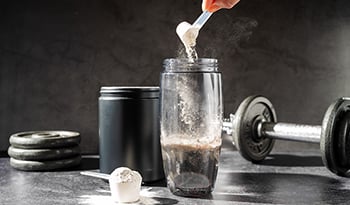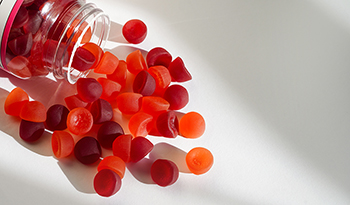Beta-Alanin Egzersiz Performansını Nasıl Artırabilir?

Egzersiz performansını iyileştirme arayışındaysanız, beta-alanintakviyesini duymuş olabilirsiniz. Bu takviyenin dayanıklılık performansı için önemli faydaları olduğuna inanılmaktadır. Ama vücutta tam olarak ne yapar? Beta-alanin sadece belirli dayanıklılık çalışmalarına fayda sağlar mı, yoksa her türlü egzersiz için faydalı mı?
Yeni bir takviyeye yatırım yapmadan önce, potansiyel faydaları ve yan etkileri ile birlikte ne yaptığını anlamak iyi bir fikirdir. Bu yazıda beta-alaninin ne olduğuna, nasıl çalıştığına, performansınıza nasıl fayda sağlayabileceğine ve stratejik olarak nasıl kullanılacağına dalacağız.
Beta-Alanin Nedir?
Beta-alanin bir amino asittir. Esansiyel olmayan bir amino asit olarak kabul edilir, bu da vücutta üretildiği anlamına gelir. Çoğu amino asit protein için yapı taşı görevi görürken, bazıları - beta-alanin gibi - vücutta başka işlevlere hizmet eder.
Beta-alanin, vücudun iskelet kasında depolanan doğal bir antioksidan olan karnosininyapı taşıdır. Karnosin, protein sentezi sırasında kullanılan bir amino asit olan beta-alanin ve histidinden oluşur. Karnosin, pH seviyelerinin düştüğü dönemlerde kaslarda aşırı hidrojen iyonlarının salınmasını önlemeye yardımcı olur.
İnsan vücudunda bulunmasının yanı sıra, beta-alanin diğer hayvanların vücutlarında da bulunur. Beta-alaninin diyet kaynakları arasında et, kümes hayvanları ve balık bulunur.
Beta-Alanin Nasıl Çalışır?
İskelet kasında çok fazla hidrojen iyonu salındığında, sonuç, kas pH seviyelerinde düşüşe neden olan asidozdur. Bu asit birikimi yorgunluğa neden olabilir ve yüksek yoğunluklarda performansı etkileyebilir. Beta-alanin bu yorgunluğun başlangıcını geciktirebilir ve genel pH yönetimine yardımcı olabilir. Sıkı bir eğitim alan bireylerin daha yüksek kas karnosin seviyelerine sahip oldukları gösterilmiştir.
Vücutta bulunan beta-alanin miktarını artırabilir ve karnosin için mevcut kaynakları iyileştirebilirsek, kaslarda karnosin seviyeleri artabilir. Bu, performans söz konusu olduğunda beta-alaninin sahip olabileceği önerilen dayanıklılık yararına yol açar.
Beta-Alanin: Araştırmanın Gösterdiği Şey
Teoride, beta-alanin , yüksek yoğunluklu egzersiz sırasında yorgunluk başlangıcını uzatmak için mükemmel bir takviye gibi geliyor. Bununla birlikte, her aktif ortamda mükemmel çalışmaz.
Amino Asitler Dergisi'nde yayınlanan 2012 meta-analizi, beta-alaninin egzersiz için faydalarını değerlendiren 15 çalışmayı analiz etti. Yazarlar, beta-alaninin, çeşitli test kriterlerini içeren birden fazla çalışmada performansı nasıl etkilediğini araştırmak istediler.
Analizleri üzerine, yazarlar beta-alanin ve aktif bireyler için en iyi önerilen kullanımları hakkında birkaç not aldılar.
- Beta-alanin, 60 saniyeden az süren aktivite için ihmal edilebilir faydalara sahiptir.
- Beta-alanin 60-240 saniye arasında süren aktiviteler için faydalı olabilir.
- Beta-alaninin etkileri birden fazla faktöre bağlı olarak değişir ve egzersiz kapasitesi üzerinde ergojenik bir etkiye sahip olabilir.
- Araştırmalar, beta-alaninin 240 saniyeden fazla süren egzersiz üzerindeki etkisi ile sınırlıdır.
Meta-analizlerini tamamlamak için yazarlar, beta-alanin üzerine yapılan araştırmaların hala bebeklik aşamasında olduğunu ve kesin sonuçlar çıkarmadan önce daha kapsamlı çalışmaların yapılması gerektiğini belirtti.
Yani, beta-alanin 60-240 saniyeye kadar uzanan yüksek yoğunluklu egzersizden fayda sağlayabilir, peki ya güç ve güç?
2018'de yayınlanan bir çalışma, beta-alaninin 5 haftalık bir direnç eğitim programını takiben deneklerle güç çıkışını nasıl etkilediğini araştırdı. Yazarlar, bazıları plasebo, bazıları beta-alanin alan olan 30 eğitimli kişiyi test etti ve onlara haftada üç kez sırt çömelmesi, halter basamakları ve yüklü atlama akciğerleri içeren bir bacak antrenmanı yaptırdı.
Beş hafta boyunca, iş yükü hacimle birlikte kademeli olarak artırıldı. Beşinci haftanın sonunda, yazar denekleri tekrar test etti ve beta-alanin grubunun plasebo alan gruba göre üstün güç çıkışı gösterdiğini buldu.
Beta-Alaninin Diğer Faydaları
Carnosine'nin antioksidan özelliklerinin atletik performanstan daha fazlasına fayda sağladığı gösterilmiştir. Serbest radikalleri nötralize ederek ve oksidatif stresi azaltarak, beta-alanin takviyesi yaşlanma karşıtı faydalara sahip olabilir ve vücudun bağışıklık sistemi tepkisini de artırabilir.
Çalışmalar ayrıca beta-alaninin yaşlı bireylerde kas kalitesine ve fonksiyonuna yardımcı olabileceğini göstermiştir. Bu, düşmeleri önlemeye yardımcı olabilir ve ileri yaştaki insanlar için daha iyi bir yaşam kalitesine yol açabilir.
Beta-Alanin Nasıl Kullanılır
Önerilen Dozaj
Genel olarak, beta-alanin seviyeleri, egzersiz öncesi formüller, amino asit takviyeleri ve diğer karışımlar gibi ürünler içinde değişecektir. Eğer kişi yeterli beta-alanin elde ettiğinden emin olmak istiyorsa, bağımsız bir beta-alanin takviyesi kullanımını düşünmelidir.
Optimal dozaj söz konusu olduğunda, 2g-6g'nin aktif bireyler için en faydalı olduğu öne sürülmüştür. Bazı bireylerin ne kadar ihtiyaç duyduğu konusunda araştırmalar hala incedir, bu nedenle bu aralık aktivite seviyesi ve vücut kompozisyonu gibi faktörlere bağlı olarak değişecektir.
Beta-Alaninin Zamanlaması
Egzersiz yararı için beta-alanin tüketiminin zamanlaması söz konusu olduğunda, genel kural, yaklaşık 30-45 dakika öncesi aktivite yapmaktır. Bu, çoğu antrenman öncesi formül için önerilere de benzer.
30-45 dakikalık ön aktivite norm olma eğiliminde olsa da, beta-alanin tüketmek için uygulanabilecek tek yöntem bu değildir. Beta-alaninin güç çıkışı üzerindeki etkilerini araştıran yukarıda atıfta bulunulan 2018 çalışması, kullanıcıların günde altı kez veya 1.5 saatte bir 800 mg'lık doz tüketmesini sağladı. Katılımcılara her gün verilen toplam miktarın önerilen aralıktan biraz daha yüksek olan 6.4 g olduğunu belirtmek önemlidir.
Beta-Alaninin Potansiyel Yan Etkileri
Beta-alanin genellikle güvenli kabul edilir. Beta-alanin hakkında dikkat edilmesi gereken bir şey, yüksek dozlarda cildin karıncalanma hissi olan paresteziye neden olabileceğidir. Aktif bireyler genellikle beta-alanin takviyesi yaparken bu fenomeni yüz, boyun ve eller çevresinde yaşayacaklardır.
Yaşanan karıncalanma miktarı genellikle alınan genel beta-alanin dozajına karşılık gelir. Ve tam olarak rahat bir his olmasa da, parestezi tehlikeli değildir ve genellikle 5-10 dakika içinde kaybolur.
Beta-alanin hamile veya emziren kadınlar için önerilmez.
Sonuç olarak, beta-alanin 60-240 saniye arasında değişen yüksek yoğunluklu egzersiz için faydalar önermiştir ve aynı zamanda güç çıkışını da artırabilir. Beta-alanin takviyesi yapmayı seçmeden önce, genel egzersiz hedefleriniz hakkında doktorunuzla konuşmak ve dozaj önerileri almak iyi bir fikirdir.
Referanslar:
- https://www.ncbi.nlm.nih.gov/pmc/articles/PMC3374095/
- https://www.researchgate.net/publication/235906030_Carnosine_From_exercise_performance_to_health
- https://www.ncbi.nlm.nih.gov/pmc/articles/PMC5918575/
- https://www.ncbi.nlm.nih.gov/pubmed/18992136/
FERAGAT:SAĞLIK MERKEZİ tanı koymayı hedeflememektedir...
















































































 İçindekiler
İçindekiler
















